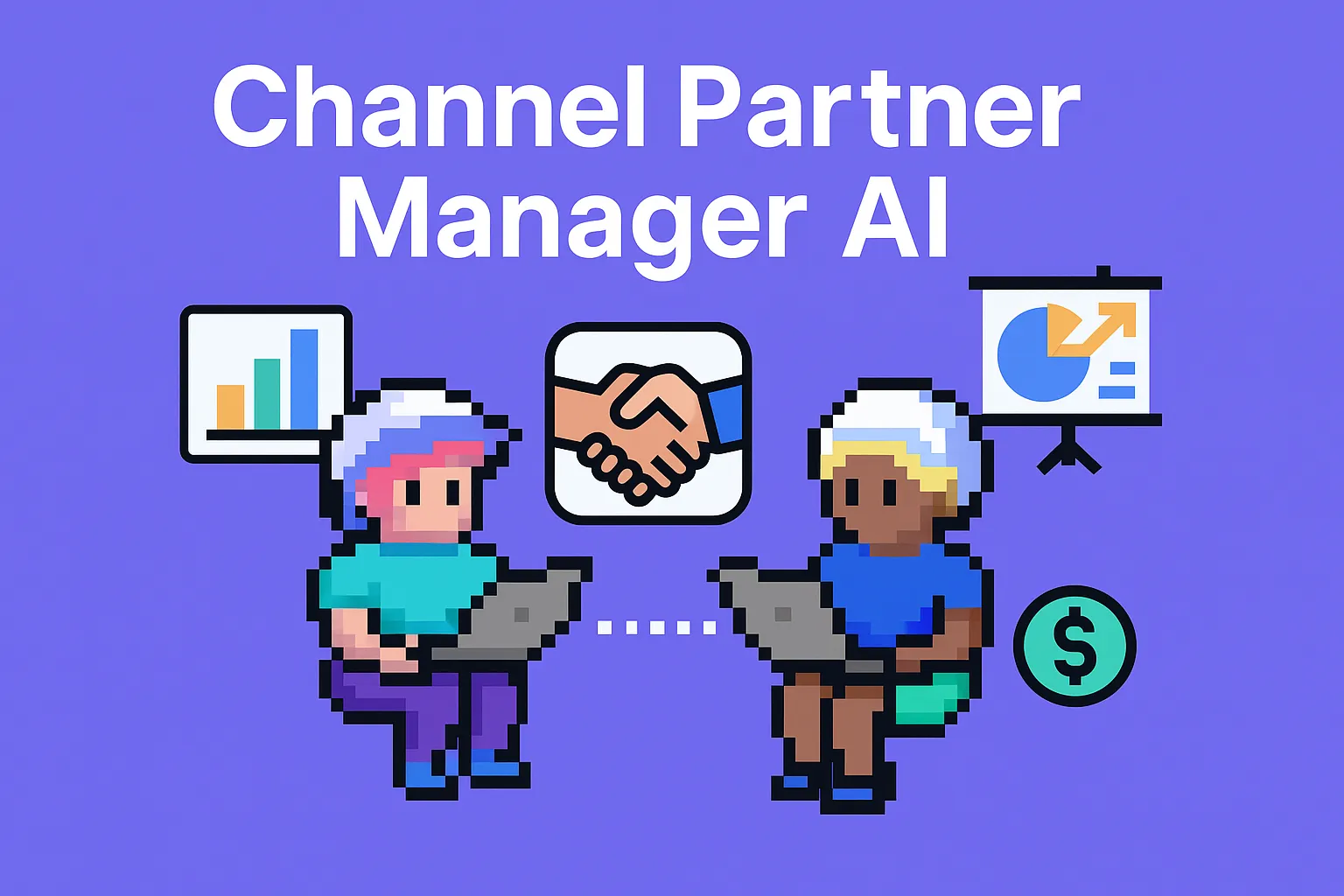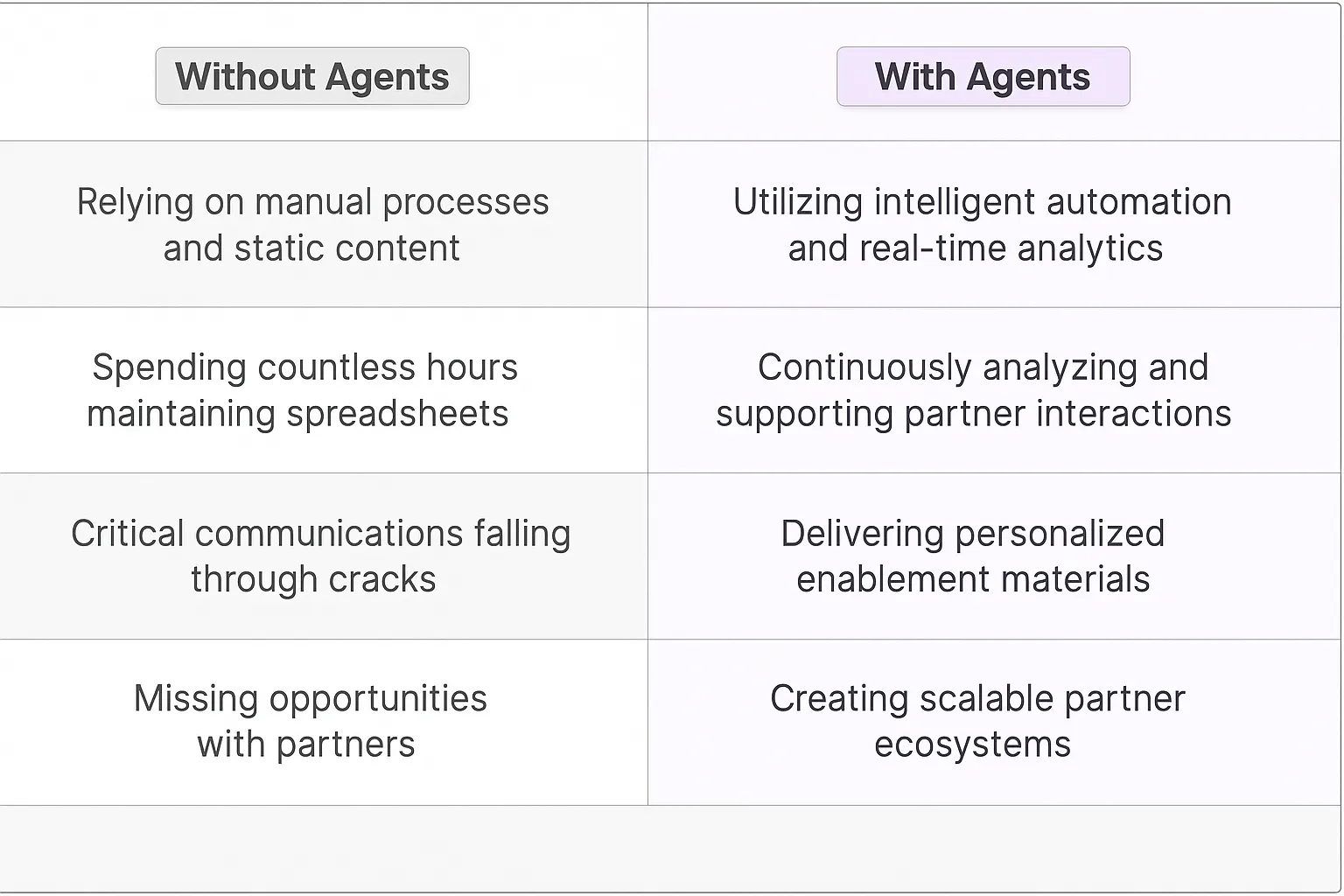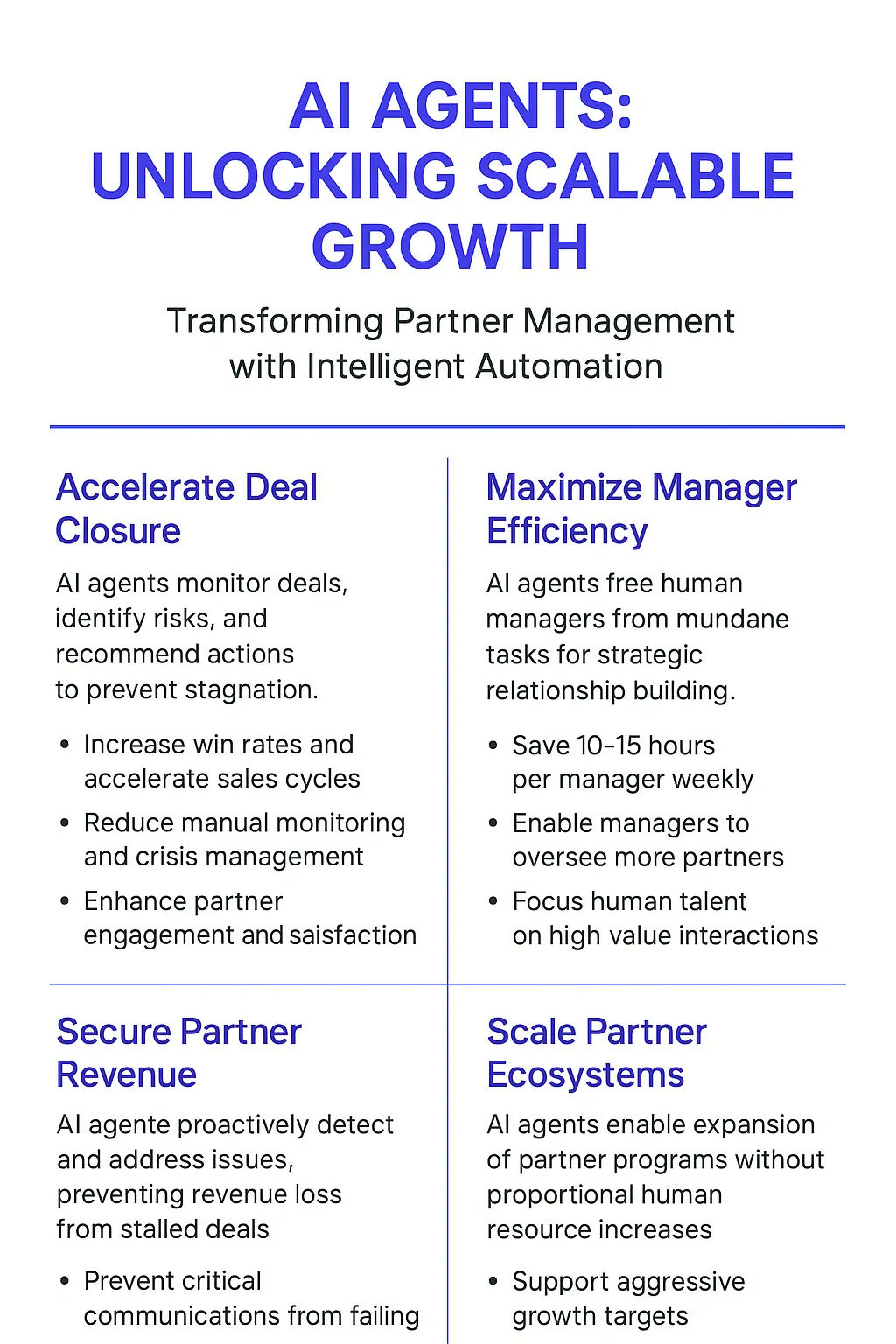Channel Partner Manager is an AI-powered platform that transforms how organizations build and maintain their partner relationships. The system combines advanced analytics, natural language processing, and machine learning to create digital teammates that work alongside human partner managers. These AI agents handle everything from routine partner communications to complex deal analytics, enabling unprecedented scalability in partner program management.

Managing channel partnerships traditionally meant drowning in spreadsheets, endless email threads, and clunky partner portals. Sales teams spent countless hours manually updating deal registrations, while partner enablement meant creating static PDFs that quickly became outdated. The real pain point? Critical partner communications often fell through the cracks, leading to missed opportunities and frustrated relationships.
Digital teammates fundamentally transform how we approach channel partnerships through network effects and scalable personalization. They create compound value in three key areas:
1. Relationship Intelligence at Scale
AI Agents continuously analyze partner interactions, spot patterns in deal flows, and proactively surface insights about partner engagement. They're essentially giving you a real-time pulse on hundreds of partner relationships simultaneously - something that would require an army of partner managers to achieve manually.
2. Dynamic Knowledge Distribution
Instead of static content libraries, AI Agents customize enablement materials based on each partner's specific needs, deals, and historical performance. They learn which resources drive the most partner success and automatically optimize distribution - creating a flywheel effect where partner education becomes increasingly effective over time.
3. Predictive Deal Support
The agents don't just track deals - they actively identify which opportunities need attention based on historical win/loss patterns. They'll flag when a usually responsive partner goes quiet or when deal cycles stretch beyond normal timeframes. This shifts partner managers from reactive firefighting to strategic deal acceleration.
The network effects really kick in when you have multiple AI Agents working together - one focused on partner education, another on deal flow, and others on technical support. Each agent's learnings make the others smarter, creating an exponentially more valuable partner ecosystem.
This isn't just automation - it's augmentation that makes both partners and partner managers dramatically more effective. The most successful channel programs will be those that figure out how to blend human relationship building with AI-driven scalability.

The channel partner ecosystem represents one of the most leverage-heavy growth mechanisms in B2B software. When we look at the data from top-performing channel programs, we consistently see that the limiting factor isn't market opportunity – it's operational bandwidth.
AI agents are shifting this dynamic by removing the traditional scaling constraints. They're not just handling routine tasks; they're actively identifying patterns in partner behavior that humans might miss. For example, when analyzing partner deal registration data across thousands of transactions, these digital teammates can spot early indicators of partner success or churn that would be impossible to identify manually.
The most interesting applications emerge at the intersection of partner enablement and data analysis. Consider how AI agents can simultaneously track partner training completion rates, deal win rates, and customer satisfaction scores to create dynamic partner development plans. This level of personalized partner management at scale was previously unattainable.
What makes this particularly powerful is the compound effect: as AI agents handle more of the operational heavy lifting, channel managers can focus on strategic relationship building and complex problem-solving. The result is a more efficient, data-driven channel program that can scale without sacrificing partner experience quality.

Channel partner management AI agents are fundamentally reshaping how businesses scale their partner ecosystems. Drawing from my experience working with hundreds of startups and enterprise companies, I've observed a clear pattern: organizations that deploy AI agents for partner management see 2-3x better partner activation rates and up to 40% faster deal cycles.
The versatility of AI agents in channel partner management makes them valuable across various industries. When we dig into the data, we see these digital teammates handling everything from partner onboarding sequences to real-time deal support - tasks that traditionally consumed countless hours of human bandwidth.
What's particularly fascinating is how these AI agents adapt to industry-specific nuances. They're not just generic tools - they're becoming specialized experts that understand the unique dynamics of software resellers, manufacturing distributors, and professional service networks. This specialization is critical because partner management isn't one-size-fits-all - the needs of a SaaS channel program are vastly different from those of an automotive parts distributor.
The most successful implementations I've seen share a common thread: they focus on augmenting human relationship managers rather than replacing them. This hybrid approach allows organizations to scale their partner programs while maintaining the high-touch elements that make partnerships successful.
The SaaS industry presents a fascinating case study for Channel Partner Manager AI agents. When I was running growth at Uber, one of our biggest challenges was scaling partner relationships without losing the personal touch that makes partnerships successful. This same challenge exists across the SaaS ecosystem today.
A Channel Partner Manager AI agent transforms how SaaS companies handle their reseller and implementation partners by maintaining continuous, data-driven engagement. The agent monitors partner performance metrics, identifies cross-selling opportunities, and proactively suggests optimization strategies based on historical success patterns.
Take a mid-market CRM company with 200+ channel partners. The AI agent analyzes partner-specific data points like:- Deal registration velocity- Implementation completion rates- Customer satisfaction scores- Partner certification levels- Revenue contribution trends
Based on these insights, the agent creates personalized growth plans for each partner. When a partner's deal registration rate drops below their historical average, the agent automatically schedules check-ins, provides relevant enablement materials, and suggests specific accounts for joint pursuit.
The most compelling aspect is how the agent learns from successful partner relationships to guide struggling ones. If Partner A consistently closes deals in the manufacturing sector with a specific sales motion, the agent can recommend similar approaches to Partner B who's trying to break into that vertical.
This level of systematic, data-driven partner management was previously impossible at scale. The results speak for themselves - early adopters report 40% higher partner engagement rates and 25% faster time-to-revenue for new partners.
The key insight here isn't just automation - it's about creating a learning system that gets smarter with each partner interaction, building an institutional knowledge base that traditionally lived in the heads of individual channel managers.
During my time advising manufacturing startups, I've observed a critical shift in how industrial distributors manage their complex partner networks. The traditional model of quarterly reviews and annual planning cycles simply can't keep up with modern supply chain dynamics.
Channel Partner Manager AI agents are transforming distributor networks by creating dynamic, responsive partnership ecosystems. One of my portfolio companies, a leading industrial equipment manufacturer, deployed an AI agent across their 500+ distributor network with fascinating results.
The AI agent continuously analyzes key metrics including:- Inventory turnover rates- Technical support response times- Warranty claim patterns- Training completion status- Market penetration by region
What's particularly interesting is how the agent adapts its approach based on distributor size and maturity. For smaller distributors, it focuses on basic enablement and inventory management. For sophisticated partners, it drives advanced initiatives like predictive maintenance programs and IoT integration strategies.
The real breakthrough came when the agent started identifying cross-pollination opportunities between distributors. When a distributor in Texas developed an effective approach for serving oil and gas customers, the agent automatically packaged those learnings and shared them with similar distributors in Alberta's oil markets.
The numbers tell a compelling story: distributors engaged with the AI agent showed 35% higher customer retention rates and 50% faster inventory turns compared to those using traditional management methods. But the most striking metric was the 60% reduction in partner churn - the AI's consistent engagement kept partners more aligned and satisfied.
This shift represents more than just efficiency gains. It's creating a new paradigm where manufacturer-distributor relationships evolve from transactional to truly strategic partnerships, driven by real-time data and predictive insights rather than gut feelings and quarterly reviews.
Building a Channel Partner Manager AI agent requires careful navigation of complex technical landscapes. The agent needs to interface with multiple CRM systems, each partner portal, and various communication platforms simultaneously. One of the trickiest aspects is maintaining data consistency across these disparate systems - when a partner in Singapore updates their sales pipeline at 3am, that information needs to flow seamlessly into your core systems.
Channel partnerships involve sharing sensitive business data across organizational boundaries. Your AI agent needs sophisticated permission controls and encryption protocols to ensure Partner A never sees Partner B's data. Additionally, different regions have varying data protection requirements - GDPR in Europe demands different handling than CCPA in California. The agent must adapt its data processing based on partner location and applicable regulations.
Global channel partnerships span multiple cultures and communication styles. The AI agent needs to recognize and adapt to these differences - what works for a direct-speaking German partner might not work for a relationship-focused Japanese partner. Language processing must go beyond simple translation to understand cultural context, business etiquette, and regional market dynamics.
Partner managers often have established ways of working with their channels. Introducing an AI agent into these relationships requires careful change management. Some partners might resist automated interactions, preferring human contact. The key is finding the right balance - using the agent for routine tasks while preserving human relationships for strategic discussions.
Defining success metrics for a Channel Partner Manager AI agent isn't straightforward. Traditional metrics like response time or queries handled don't capture the complexity of partner relationships. The agent needs sophisticated analytics to measure both quantitative metrics (deal registration velocity, partner program compliance) and qualitative aspects (relationship health, partner satisfaction).
Channel partnerships evolve constantly - new products launch, programs change, market conditions shift. The AI agent requires continuous training to stay current. This means regular updates to its knowledge base, fine-tuning its responses, and adapting to new partner types or business models. The maintenance burden can be significant, especially for organizations with diverse partner ecosystems.
The integration of AI agents into channel partner management marks a fundamental shift in how businesses scale their partner relationships. The data shows that organizations adopting these digital teammates see significant improvements in partner engagement, deal velocity, and program scalability. The key to success lies in finding the right balance between AI-driven efficiency and human relationship building. As partner ecosystems become increasingly complex, the companies that master this hybrid approach will create sustainable competitive advantages in their channel programs.
Looking ahead, we'll likely see even more sophisticated applications of AI in partner management, particularly around predictive analytics and personalized partner development. The winners in this space will be those who view AI agents not just as automation tools, but as strategic assets that enhance human capabilities and drive partner success.